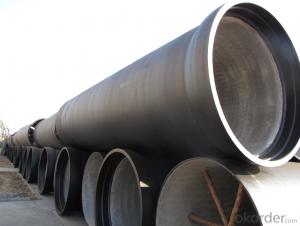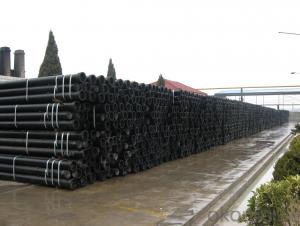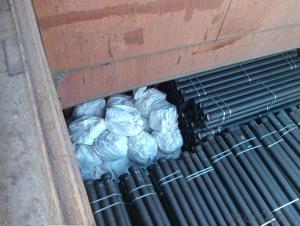Ductile Iron Pipe DN1400
OKorder Service Pledge
Quality Product, Order Online Tracking, Timely Delivery
OKorder Financial Service
Credit Rating, Credit Services, Credit Purchasing
You Might Also Like
Specifications
Quick Details
| Place of Origin: | China (Mainland) | Brand Name: | CMAX | Model Number: | T type / K type / Flange type |
| Length: | 6m / 5.7m / Negotiable | Standard: | ISO2531 / EN545 / EN598 | Application: | Potable / Sewage water |
| Diameter: | DN80~DN2200 | Shape: | Round | Hardness: | 230 |
| Pipe Wall Thickness: | standard | Pull Strength: | 420 | Yield (≥ MPa): | 300 |
| Material: | Ductile Iron | Type: | Centrifugal ductile cast iron pipe | Certification: | ISO2531 / EN545 / EN598 |
| Outer Diameter: | 80-2200 | Thickness: | standard | Specification: | DN80~DN2200 |
| |
The advantages to the customer:
Trustworthy financial strength.
One-stop shopping.
Fast and efficient service.
Coordination of shipments from multiple plants.
Specialists of the overseas shipping process.
A more competitive price.
- Q:What is the difference between a cast iron pipe and a ductile iron pipe?
- Nodular cast iron has high strength and strong plasticity. The tensile strength of ductile iron is twice that of gray iron, and the yield strength even exceeds that of cast steel.
- Q:Are there any alternatives to ductile iron pipe for water distribution?
- Yes, there are several alternatives to ductile iron pipe for water distribution. Some common alternatives include PVC (Polyvinyl Chloride) pipes, HDPE (High-Density Polyethylene) pipes, and PEX (Cross-linked Polyethylene) pipes. Each of these alternatives has its own advantages and disadvantages in terms of cost, durability, ease of installation, and resistance to corrosion. The choice of alternative pipe material depends on factors such as the specific requirements of the water distribution system, budget constraints, and local regulations.
- Q:Can ductile iron pipes be used for trenchless installation methods?
- Yes, ductile iron pipes can be used for trenchless installation methods. Trenchless installation methods, such as horizontal directional drilling or pipe bursting, allow for the installation of pipes without the need for extensive excavation. Ductile iron pipes are known for their strength, durability, and flexibility, making them suitable for these trenchless methods. Additionally, ductile iron pipes have excellent resistance to corrosion and can withstand high-pressure conditions, further enhancing their suitability for trenchless installation.
- Q:Can ductile iron pipes be used in areas with high levels of hydrogen sulfide gas and corrosion potential?
- Ductile iron pipes can be used in areas with high levels of hydrogen sulfide gas and corrosion potential, but it is important to consider certain factors before making a decision. Ductile iron pipes have a high resistance to corrosion, especially when they are properly protected with external coatings and linings. This makes them suitable for environments with moderate levels of hydrogen sulfide gas and corrosion potential. However, in areas with extremely high levels of hydrogen sulfide gas and severe corrosion potential, other materials like corrosion-resistant alloys or specially coated pipes may be more appropriate. It is crucial to conduct a thorough evaluation of the specific conditions in the area to determine the suitability of ductile iron pipes. Factors such as the concentration of hydrogen sulfide gas, the presence of other corrosive elements or chemicals, and the overall corrosiveness of the environment should be considered. Additionally, the local regulations and industry standards must be consulted to ensure compliance and safety. In conclusion, while ductile iron pipes can withstand moderate levels of hydrogen sulfide gas and corrosion potential, a comprehensive assessment of the specific conditions is necessary to determine their suitability. Consulting with experts in the field and considering alternative materials may be required in areas with high levels of hydrogen sulfide gas and severe corrosion potential.
- Q:Can ductile iron pipes be used for water supply in remote areas?
- Yes, ductile iron pipes can be used for water supply in remote areas. Ductile iron pipes are known for their strength and durability, making them suitable for various applications, including water supply systems. Their resistance to corrosion and ability to withstand high pressure make them a reliable choice for transporting water even in remote areas where maintenance and accessibility may be challenging.
- Q:Are ductile iron pipes suitable for use in brewery facilities?
- Yes, ductile iron pipes are suitable for use in brewery facilities. Ductile iron pipes are durable, corrosion-resistant, and can withstand high-pressure applications, making them ideal for transporting water, steam, and other fluids within brewery facilities. Additionally, the smooth interior surface of ductile iron pipes minimizes friction and prevents the build-up of sediments or organic materials, ensuring the purity and quality of the beer being produced.
- Q:Are ductile iron pipes suitable for installation in areas with high soil compaction and traffic loads?
- Yes, ductile iron pipes are suitable for installation in areas with high soil compaction and traffic loads. Ductile iron pipes have high strength and durability, making them capable of withstanding heavy loads and compression from soil compaction. They offer excellent resistance to external forces and have a long lifespan, making them a reliable choice for such conditions.
- Q:What is the expected leakage rate of ductile iron pipes?
- The expected leakage rate of ductile iron pipes can vary depending on various factors such as the age and condition of the pipes, the quality of installation, and the presence of any external factors that may impact the integrity of the pipes. However, in general, ductile iron pipes are known for their durability and low leakage rates compared to other types of pipes. According to industry standards and studies, the expected leakage rate of well-maintained and properly installed ductile iron pipes is typically less than 0.5 liters per pipe per day (LPPD). This leakage rate is considered acceptable and meets the requirements set by various regulatory bodies and organizations. It is important to note that regular maintenance and inspections are crucial in maintaining the low leakage rate of ductile iron pipes. By identifying and repairing any potential leaks or damages promptly, the overall leakage rate can be effectively minimized. Furthermore, advancements in manufacturing techniques and improvements in pipe design have led to the development of more leak-resistant ductile iron pipes. These pipes may have even lower expected leakage rates than the industry average, further enhancing their overall performance and reliability. Ultimately, while the expected leakage rate of ductile iron pipes can vary, it is generally considered to be low when properly installed and maintained, making them a reliable choice for various water distribution and transmission systems.
- Q:The difference between cast iron pipe and ductile iron pipe
- Ductile iron is based on the cast iron to change some of the characteristics of the structure of iron, so that it has become a lot of toughness, than the cast iron pipe is too brittle shortcomings much better, the tensile strength of the pipe bending strength greatly improved. The sealing material used in the socket interface is rubber ring.
- Q:Can ductile iron pipes be used for gravity sewer systems?
- Yes, ductile iron pipes can be used for gravity sewer systems. Ductile iron pipes are known for their durability, strength, and resistance to corrosion, making them suitable for various applications including sewer systems. These pipes have excellent tensile strength and can withstand high pressure and heavy loads, making them ideal for gravity sewer systems where wastewater flows by gravity rather than being pumped. Additionally, ductile iron pipes have a long lifespan and require minimal maintenance, making them a cost-effective choice for sewer infrastructure.
1. Manufacturer Overview |
|
|---|---|
| Location | |
| Year Established | |
| Annual Output Value | |
| Main Markets | |
| Company Certifications | |
2. Manufacturer Certificates |
|
|---|---|
| a) Certification Name | |
| Range | |
| Reference | |
| Validity Period | |
3. Manufacturer Capability |
|
|---|---|
| a)Trade Capacity | |
| Nearest Port | |
| Export Percentage | |
| No.of Employees in Trade Department | |
| Language Spoken: | |
| b)Factory Information | |
| Factory Size: | |
| No. of Production Lines | |
| Contract Manufacturing | |
| Product Price Range | |
Send your message to us
Ductile Iron Pipe DN1400
OKorder Service Pledge
Quality Product, Order Online Tracking, Timely Delivery
OKorder Financial Service
Credit Rating, Credit Services, Credit Purchasing
Similar products
New products
Hot products
Hot Searches
Related keywords


























